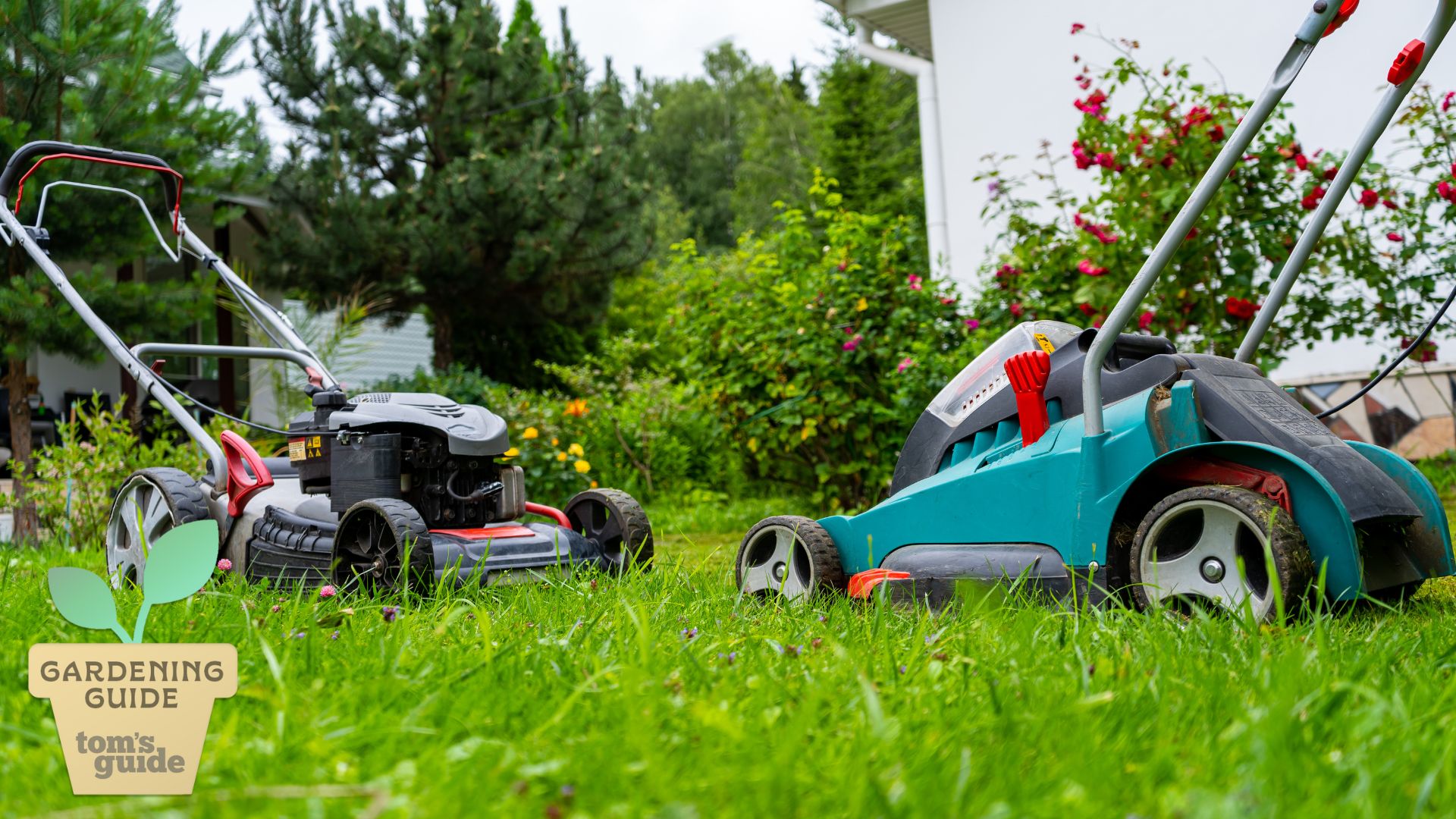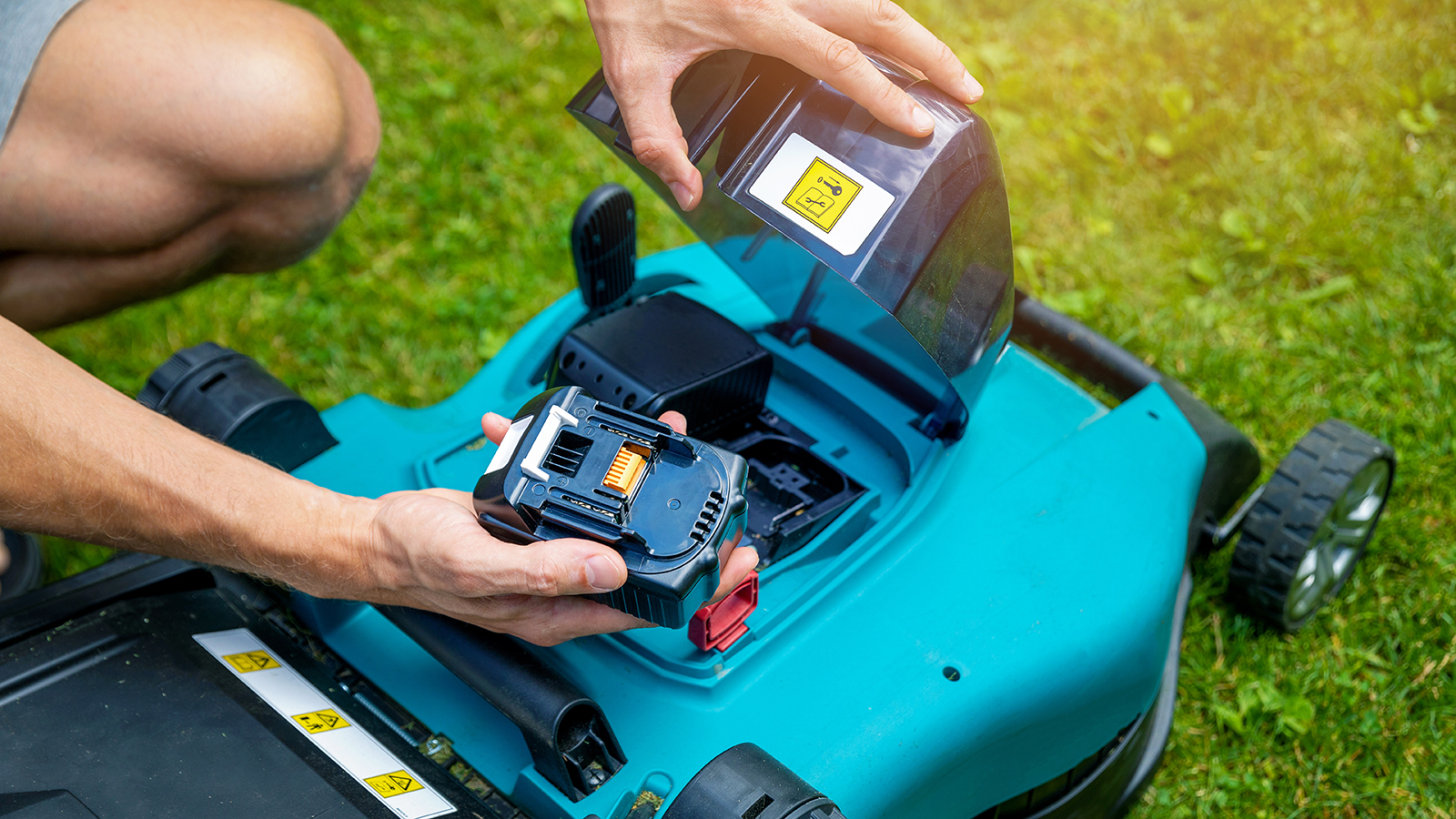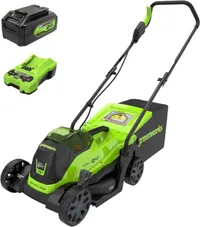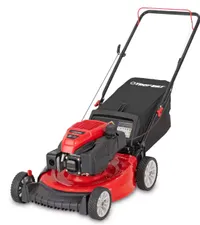Electric lawnmower vs. gas lawnmower — which is right for you?
How to choose the right fuel source for your lawnmower

As the weather warms up and you say goodbye to winter until next year, you can breathe a sigh of relief that summer is almost here.
However, along with warmer weather comes mowing season. For many, this warm-weather chore quickly goes from a sign of spring to a dreaded task that you wish would take care of itself.
But if you have the proper equipment, mowing your lawn doesn’t have to be a chore.
“When weighing the pros and cons of choosing either an electric or gas mower, there are many considerations that have to be evaluated,” explains Eduard Negodenko, landscaping expert and gardener at Avanti Landscaping.
Here’s what you need to know about these two popular lawnmower options.
Electric lawnmowers explained

Some electric lawnmowers are powered by batteries that must be charged before use.
Many modern electric lawnmowers use lithium-ion batteries, which help them run longer, so you don’t need to stop mowing to recharge the battery. Others are powered by an electrical cord that must be plugged into an outlet for the machine to work.
Get instant access to breaking news, the hottest reviews, great deals and helpful tips.
These corded electric mowers are usually better for those with small lawns, as they can mow the entire yard without an extension cord.
What are the pros of an electric lawnmower?
An electric lawnmower is an excellent option for homeowners looking for an eco-friendly, quiet machine for cutting grass. Here are the main benefits of choosing this type of mower.
Less noisy
One of the biggest benefits of an electric mower is the low noise level. “They rarely make noise compared to gas-powered mowers, and thus they can be used in loud-restricted neighborhoods without bothering the neighbors,” explains Negodenko.
This lets you mow your grass at a time that works best for you without worrying that you’ll disturb the neighborhood.
Lower emmissions

Electric mowers don’t produce emissions, making them ideal for homeowners who want to make the most sustainable choice.
“Electric mowers, either corded or battery-powered, are on par with eco-friendliness, having [zero] emissions,” explains Negodenko.
Some municipalities have banned gas mowers and other power tools to reduce carbon emissions; if you live in one of these areas, an electric mower is the clear choice.
This cordless Greenworks mower offers 30 minutes of runtime, but can be extended by buying additional batteries.
Now 28% off at Amazon and with thousands of five-star reviews, we think it's a great option.
Low maintenance
Electric mowers are typically easier and cheaper to maintain than their gas counterparts.
“Maintenance will be less because there is no oil change, fuel refill, or spark plug replacement,” explains Negodenko.
You might need to replace the battery after a few years of consistent use, but your yearly maintenance on an electric mower will be negligible compared to a gas-powered one.
What are the cons of an electric lawnmower?
Electric lawnmowers have several disadvantages to keep in mind when you’re deciding whether or not to buy one. Here’s what you need to know.
Shorter runtimes
Cordless electric lawnmowers are limited by their battery power. Once the battery dies, you must recharge the mower before you can finish mowing the grass.
This might not be an issue if your lawn is small, but it can become a problem for larger lawns. Stopping mowing to recharge your lawnmower adds time to the task.
Less power
Electric mowers often don’t have as much power as their gas counterparts, which makes them less ideal for large or uneven lawns.
“[Electric] mowers do not have quite the raw power for cutting thick, overgrown grass or rough terrain,” Negodenko says.
Gas lawnmowers explained

Gas lawnmowers are powered by the same gasoline you put in your car. They are powerful machines that can tackle a wide range of terrains, and refueling is as easy as grabbing your gas can and filling the tank back up.
It might have a pull-start or a button start, depending on which type of gas mower you buy. Once the mower gets going, you can cut a large area of grass with one tank of fuel — no need to stop and recharge a battery partway through the task.
Gas mowers require regular maintenance to keep them in good working order, but their replacement parts are usually quite affordable compared to a replacement battery for an electric mower.
They’re also noisier than electric mowers, which may be a concern if you live in a densely packed neighborhood.
However, gas mowers are easy to find and affordable, making them a great choice for the average homeowner.
What are the pros of a gas lawnmower?
Gas lawnmowers are pros at cutting grass, whether you have a small, even lawn or a larger, hillier one. Here are the pros of buying a gas lawnmower.
Easy refuelling
Refueling a gas lawnmower is simple. You’ll need a gas can filled with gasoline, but if you keep one on hand, you just need to remove the gas tank’s cap and pour in the replacement fuel.
Once the tank is full, you can start mowing immediately. This means you can mow large lawns faster without worrying about recharging a battery.
More powerful
Gas lawnmowers tend to be more powerful than electric ones. “They can enjoy the benefit of more torque and longer runtime without being restricted by a battery or power cord,” says Negodenko.
They have more horsepower, which lets them tackle long grass and uneven terrain much more easily than an electric lawnmower could manage.
This 21-inch gas lawn mower from Troy-Bilt is built in America, and designed for half-acre yards. Its 1.9 bushel rear bag collects grass and leaves for composting.
Good for big yards

If you have an expansive backyard, a gas lawnmower may suit your needs better. “Gas-powered mowers are [best] for homeowners who have large yards, tough grass species, such as Bermuda or St. Augustine, or hilly types of landscapes,” explains Negodenko.
Gas mowers can operate longer between refueling, so you can usually mow your entire yard in one session.
What are the cons of a gas lawnmower?
Gas lawnmowers are powerful and easy to use, but they have their share of downsides, too. “They do require regular maintenance, emit fumes, and, in general, [are] noisier than electric models,” explains Negodenko.
Below are the main disadvantages of gas lawnmowers.
Higher maintenance requirements
Gas lawnmowers need to be maintained to keep them in good working order. If you’re uncomfortable performing maintenance on your mower, you’ll need to pay a pro to do it for you, which adds to the overall cost of ownership.
However, the replacement parts for a gas mower are relatively affordable, so long-term ownership costs are generally low.
Loud operation

There’s no getting around it: gas lawnmowers are noisy. You may need ear protection while operating a gas mower to prevent hearing loss, and your neighbors will dread your weekly mowing session.
Some areas have noise restrictions, so check to see whether this applies to you since it can limit your choices regarding the type of lawnmower to buy.
Which is right for you?
Both electric and gas lawnmowers can cut grass quickly and efficiently. If you prioritize power and functionality, a gas mower might be the best choice since it can be easily refueled and has the power to tackle long, thick grass.
However, an electric mower is your best option if you want a sustainable and quiet lawn-cutting option.
Ultimately, either choice will serve you well and keep your grass healthy, lush, and green throughout the summer.
More from Tom's Guide
- 7 tips for planting grass seed to get a greener lawn
- What’s the perfect time to give your lawn its first cut?
- 7 tips to banish weeds from your lawn that won't harm the grass

Catherine Hiles has over a decade of experience writing and editing on various topics, including home improvement, personal finance, home finances, pet ownership, and parenting. Her work has been featured on BobVila.com, TIME Stamped, The Penny Hoarder, and more. In her spare time, Catherine enjoys running, reading, spending time with her kids and dogs, and tackling projects around the house.
You must confirm your public display name before commenting
Please logout and then login again, you will then be prompted to enter your display name.
 Club Benefits
Club Benefits







